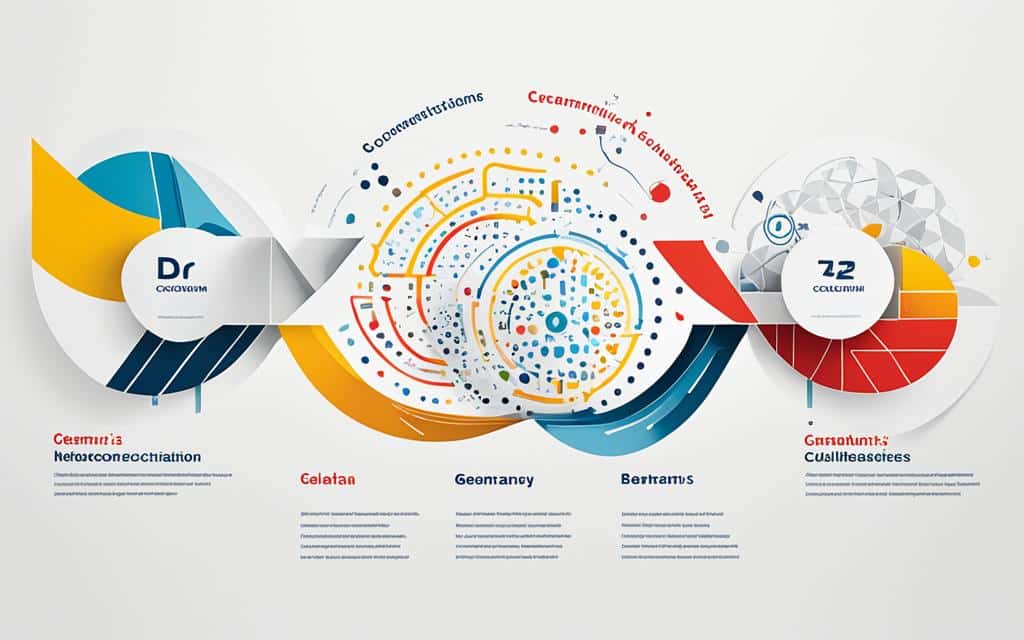Germany is renowned for its unwavering commitment to research and innovation. With a rich history of scientific excellence and a strong emphasis on collaboration, Germany continues to be a global leader in technology and innovation.
Investing heavily in research and development, Germany’s commitment to advancing knowledge and driving progress is evident in its cutting-edge research institutions and state-of-the-art facilities. The government’s support for these institutions and the financial incentives provided encourage innovation and bring forth groundbreaking discoveries.
Collaboration and knowledge exchange are key pillars of Germany’s innovation ecosystem. By fostering strong ties between academia, industry, and government, Germany encourages the sharing of expertise and accelerates the pace of innovation. The collaborative nature of its research partnerships, technology transfer programs, and conferences promotes interdisciplinary thinking and propels technological advancements.
Moreover, Germany’s industry-academia cooperation plays a crucial role in translating research findings into real-world applications. The close relationship between universities and industry allows for the commercialization of research outcomes and supports the growth of high-tech industries.
Germany is home to numerous world-class research institutions that contribute to its reputation as a hub for innovation and scientific excellence. From the Max Planck Institutes to the Fraunhofer Society, these institutions drive forward research and development initiatives in various fields.
This strong dedication to research and innovation has led to pioneering technological advancements in Germany. From artificial intelligence to renewable energy, Germany continues to push boundaries and shape the future with its innovative breakthroughs.
A Rich History of Scientific Excellence
Germany has a long-standing tradition of scientific excellence that spans centuries. Throughout history, renowned German scientists and inventors have made groundbreaking discoveries and inventions that continue to shape the world we live in today.
One of the most famous German scientists is Albert Einstein, who revolutionized the field of physics with his theory of relativity. Einstein’s contributions to science are widely regarded as some of the most significant in history, and his work continues to be studied and celebrated to this day.
In addition to Einstein, Germany has produced numerous other scientific pioneers and inventors. Johannes Gutenberg, a German blacksmith, is credited with inventing the printing press in the 15th century. This invention revolutionized the spread of knowledge and played a crucial role in the development of education and literacy around the world.
Germany’s rich history of scientific excellence extends beyond physics and printing. German scientists have made groundbreaking discoveries and advancements in various fields, including chemistry, biology, medicine, and engineering. Their contributions have had a profound impact on human progress and continue to inspire future generations of scientists.
Germany’s commitment to scientific excellence has created a culture of innovation and intellectual curiosity. The country’s investment in research and development, state-of-the-art laboratories, and renowned research institutions have allowed scientists to push the boundaries of knowledge and drive technological advancements.
In the next section, we will explore Germany’s continued investment in research and development and how it is shaping the future of innovation.
Investing in Research and Development
In Germany, the commitment to innovation and advancement is evident through its substantial investment in research and development (R&D). The government plays a crucial role in supporting research institutions and fostering a culture of innovation.
Germany recognizes the importance of state-of-the-art research facilities and actively establishes them to promote cutting-edge research. These facilities provide scientists and researchers with the necessary resources and infrastructure to conduct ground-breaking studies and experiments.
Furthermore, the German government provides financial incentives to encourage innovation and technological advancements. These incentives are designed to attract both local and international researchers, further fueling the research and development landscape in Germany.
The significant investment in R&D in Germany is instrumental in driving technological advancements. It paves the way for groundbreaking discoveries and innovations that benefit various industries and sectors, including healthcare, manufacturing, energy, and more.
By investing in research and development, Germany positions itself as a global leader in innovation and fosters a vibrant ecosystem that facilitates collaboration and knowledge exchange between researchers, scientists, and industry professionals.
Collaboration and Knowledge Exchange
Collaboration and knowledge exchange are essential elements in driving innovation and fostering progress. In Germany, a country renowned for its commitment to research and development, a thriving collaborative ecosystem has been created to facilitate partnerships between academia, industry, and government.
One of the key initiatives in promoting collaboration is the establishment of research partnerships. These partnerships bring together researchers from different disciplines and institutions, allowing for the exchange of ideas and expertise. By pooling resources and knowledge, these collaborations enable the development of innovative solutions to complex challenges.
Furthermore, Germany actively promotes the transfer of technology from research institutions to industry through technology transfer programs. These programs facilitate the translation of scientific breakthroughs into commercial applications, driving economic growth and competitiveness. By bridging the gap between academia and industry, Germany ensures that cutting-edge research is transformed into tangible products and services.
The exchange of ideas is also facilitated through conferences and forums held across the country. These events bring together experts from various fields to share their research findings and insights. This knowledge exchange not only fosters collaboration but also contributes to the overall advancement of scientific knowledge and understanding.
Germany’s collaborative ecosystem accelerates the pace of innovation by fostering a culture of openness, shared learning, and interdisciplinary collaboration. By leveraging the expertise from academia, industry, and government, Germany remains at the forefront of technological advancements in diverse fields such as artificial intelligence, renewable energy, biotechnology, and more.
Through collaboration and knowledge exchange, Germany solidifies its position as a global leader in research and innovation, driving progress and shaping the future.
Industry-Academia Cooperation
Industry-academia cooperation plays a pivotal role in realizing the practical applications of research findings. Germany’s strong ties between universities and industry ensure a seamless collaboration that fosters innovation and accelerates technological advancements. By working hand in hand, academia and industry are able to leverage each other’s strengths and resources, resulting in mutually beneficial outcomes.
One of the key benefits of industry-academia collaborations in Germany is access to a wide range of resources. Universities provide cutting-edge research facilities, state-of-the-art equipment, and a pool of talented researchers and scholars, while industry partners bring industry expertise, market knowledge, and financial resources to the table. This synergy allows for the exploration of new frontiers and the development of innovative solutions to real-world challenges.
Funding opportunities are another significant advantage of industry-academia cooperation. Collaborative research projects often receive financial support from both government grants and industry sponsors. This enables researchers to pursue ambitious and transformative projects that might not be possible with individual funding. By combining resources, academia and industry can tackle complex problems, pushing the boundaries of knowledge and driving technological breakthroughs.
The close relationship between academia and industry in Germany also facilitates the commercialization of research outcomes. With industry partners actively involved in the research process, there is a greater focus on developing ideas and technologies that have commercial potential. This helps in bridging the gap between academia and the marketplace, ensuring that innovative solutions are brought to market efficiently and effectively.
Ultimately, the strong industry-academia cooperation in Germany nurtures a culture of innovation and supports the growth of high-tech industries. By combining academic expertise with industry insights, Germany remains at the forefront of technological advancements and drives economic prosperity. Through collaborative efforts, researchers and industry leaders continue to push the boundaries of innovation, shaping a brighter future for all.
Exemplary Research Institutions
Germany boasts a plethora of world-class research institutions that are celebrated for their groundbreaking discoveries and cutting-edge research. These exceptional institutions contribute significantly to Germany’s reputation as a hub for innovation and scientific excellence. Through their relentless pursuit of knowledge, they drive forward research and development initiatives, pushing the boundaries of what is possible.
One such exemplary institution is the Max Planck Institutes, a network of research centers dedicated to various scientific disciplines. Established in 1948, the Max Planck Society carries out groundbreaking research in fields such as physics, chemistry, biology, and more. Their focus on fundamental research and interdisciplinary collaboration fosters innovation and unlocks new possibilities.
Another renowned institution is the Fraunhofer Society, a leading applied research organization. With a strong emphasis on practical applications, the Fraunhofer Society works closely with industry partners to transfer research findings into real-world solutions. Their expertise in areas such as information technology, energy, and manufacturing drives technological innovation and supports economic growth.
<!–
Text Heading
–><!–
- List item 1
- List item 2
- List item 3
–>
Pioneering Technological Advancements
Germany’s unwavering commitment to innovation has propelled it to the forefront of technological advancements. In fields such as artificial intelligence (AI), Germany continues to push the boundaries, developing cutting-edge AI systems that are transforming industries and improving lives. Whether it’s autonomous vehicles, smart manufacturing, or personalized healthcare, German companies and research institutions lead the way in harnessing the potential of AI.
Renewable energy is another area where Germany excels. With a strong focus on sustainability, the country has made significant strides in developing efficient and environmentally friendly energy solutions. From wind farms in the North Sea to solar energy projects across the country, Germany’s technological advancements in renewable energy have not only reduced carbon emissions but also set an example for the world.
In the field of biotechnology, Germany’s innovative research and development efforts have led to groundbreaking discoveries and promising advancements. With a focus on personalized medicine, German scientists and biotech companies are revolutionizing healthcare by developing targeted therapies, advanced diagnostics, and regenerative medicine solutions. These advancements offer hope for patients and contribute to the overall improvement of global healthcare.
Germany’s technological advancements are the result of a collaborative ecosystem that encourages interdisciplinary cooperation. Research institutions, industry leaders, and government bodies work hand in hand to foster innovation and drive progress. With generous funding, state-of-the-art facilities, and a culture of knowledge exchange, Germany provides the ideal environment for scientists, engineers, and entrepreneurs to turn ideas into reality.











